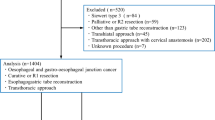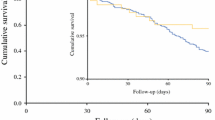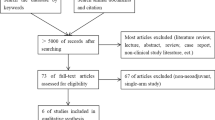Abstract
Purpose
This study aimed to compare short-term outcomes of minimally invasive esophagectomy (MIE) with those of open esophagectomy (OE) for thoracic esophageal cancer using a nationwide Japanese database.
Methods
Overall, 9584 patients with thoracic esophageal cancer who underwent esophagectomy at 864 hospitals in 2011–2012 were evaluated. We performed one-to-one matching between the MIE and OE groups on the basis of estimated propensity scores for each patient.
Results
After propensity score matching, operative time was significantly longer in the MIE group (n = 3515) than in the OE group (n = 3515) [526 ± 149 vs. 461 ± 156 min, p < 0.001], whereas blood loss was markedly less in the MIE group than in the OE group (442 ± 612l vs. 608 ± 591 ml, p < 0.001). The populations of patients who required more than 48 h of postoperative respiratory ventilation was significantly less in the MIE group than in the OE group (8.9 vs. 10.9%, p = 0.006); however, reoperation rate within 30 days was significantly higher in the MIE group than in the OE group (7.0 vs. 5.3%, p = 0.004). There were no significant differences between the MIE and OE groups in 30-day mortality rates (0.9 vs. 1.1%) and operative mortality rates (2.5 vs. 2.8%, respectively).
Conclusions
MIE was comparable with conventional OE in terms of short-term outcome after esophagectomy. It was particularly beneficial in reducing postoperative respiratory complications, but may be associated with higher reoperation rates.
Similar content being viewed by others
References
Jemal A, Bray F, Center M, et al. Global cancer statics. CA Cancer J Clin. 2011;61:69–90.
Herskovic A, Martz K, Sarraf M, et al. Combined chemotherapy and radiotherapy compared with radiotherapy alone in patients with cancer of the esophagus. N Engl J Med. 1992;326:1593–98.
Cooper JS, Guo MD, Herskovic A, et al. Chemoradiotherapy of locally advanced esophageal cancer: long-term follow-up of a prospective randomized trial (RTOG 85-01). Radiation Therapy Oncology Group. JAMA. 1999;281:1623–27.
Shitara K, Muro K. Chemoradiotherapy for treatment of esophageal cancer in Japan: current status and perspectives. Gastrointest Cancer Res. 2009;3:66–72.
Ando N, Ozawa S, Kitagawa Y, et al. Improvement in the results of surgical treatment of advanced squamous esophageal carcinoma during 15 consecutive years. Ann Surg. 2000;232:225–32.
Takeuchi H, Saikawa Y, Oyama T, et al. Factors influencing the long-term survival in patients with esophageal cancer who underwent esophagectomy after chemoradiotherapy. World J Surg. 2010;34:277–84.
Akiyama H, Tsurumaru M, Udagawa H, et al. Radical lymph node dissection for cancer of the thoracic esophagus. Ann Surg. 1994;220:364–72.
Nishihira T, Hirayama K, Mori S. A prospective randomized trial of extended cervical and superior mediastinal lymphadenectomy for carcinoma of the thoracic esophagus. Am J Surg. 1998;175:47–51.
Fujita H, Kakegawa T, Yamana H, et al. Mortality and morbidity rates, postoperative course, quality of life, and prognosis after extended radical lymphadenectomy for esophageal cancer. Comparison of three-field lymphadenectomy with two-field lymphadenectomy. Ann Surg. 1995;222:654–62.
Kinugasa S, Tachibana M, Yoshimura H, et al. Postoperative pulmonary complications are associated with worse short- and long-term outcomes after extended esophagectomy. J Surg Oncol. 2004;88:71–77.
Fang WT, Chen WH, Chen Y, et al. Selective three-field lymphadenectomy for thoracic esophageal squamous carcinoma. Dis Esophagus. 2007;20:206–211.
Takeuchi H, Miyata H, Gotoh M, et al. A risk model for esophagectomy using data of 5354 patients included in a Japanese nationwide web-based database. Ann Surg. 2014;260:259–66.
Cuschieri A, Shimi S, Banting S. Endoscopic oesophagectomy through a right thoracoscopic approach. J R Coll Surg Edinb. 1992;37:7–11.
Kawahara K, Maekawa T, Okabayashi K, et al. Video-assisted thoracoscopic esophagectomy for esophageal cancer. Surg Endosc. 1999;13:218–23.
Luketich JD, Schauer PR, Christie NA, et al: Minimally invasive esophagectomy. Ann Thorac Surg. 2000;70:906–11.
Nguyen NT, Follette DM, Lemoine PH, et al. Minimally invasive Ivor Lewis esophagectomy. Ann Thorac Surg. 2001;72:593–96.
Akaishi T, Kaneda I, Higuchi N, et al. Thoracoscopic en bloc total esophagectomy with radical mediastinal lymphadenectomy. J Thorac Cardiovasc Surg. 1996;112:1533–40.
Biere SS, van Berge Henegouwen MI, Maas KW, et al. Minimally invasive versus open oesophagectomy for patients with oesophageal cancer: a multicentre, open-label, randomised controlled trial. Lancet. 2012;379:1887–92.
Takeuchi H, Kawakubo H, Kitagawa Y. Current status of minimally invasive esophagectomy for patients with esophageal cancer. Gen Thorac Cardiovasc Surg. 2013;61:513–21.
Biere SSA, Cuesta MA, Van Del Peet DL. Minimally invasive versus open esophagectomy for cancer: a systematic review and meta-analysis. Minerva Chir. 2009;64:121–33.
Sgourakis G, Gockel I, Radtke A, et al. Minimally invasive versus open esophagectomy: metaanalysis of outcomes. Dig Dis Sci 2010;55:3031–40.
Nagpal K, Ahmed K, Vats A, et al. Is minimally invasive surgery beneficial in the management of esophageal cancer? A meta-analysis. Surg Endosc. 2010;24:1621–29.
Gotoh M, Miyata H, Hashimoto H, et al. National Clinical Database feedback implementation for quality improvement of cancer treatment in Japan: from good to great through transparency. Surg Today. 2016;46:38–47.
Shiloach M, Frencher SK Jr, Steeger JE, et al. Toward robust information: data quality and inter-rater reliability in the American College of Surgeons National Surgical Quality Improvement Program. J Am Coll Surg. 2010;210:6–16.
Tagami T, Matsui H, Horiguchi H, et al. Antithrombin and mortality in severe pneumonia patients with sepsis-associated disseminated intravascular coagulation: an observational nationwide study. J Thromb Haemost. 2014;12:1470–79.
Smithers BM, Gotley DC, Martin I, et al. Comparison of the outcomes between open and minimally invasive esophagectomy. Ann Surg. 2007;245:232–40.
Sundaram A, Geronimo JC, Willer BL, et al. Survival and quality of life after minimally invasive esophagectomy: a single-surgeon experience. Surg Endosc. 2012;26:168–76.
Kinjo Y, Kurita N, Nakamura F, et al. Effectiveness of combined thoracoscopic-laparoscopic esophagectomy: comparison of postoperative complication and midterm oncological outcomes in patients with esophageal cancer. Surg Endosc. 2012;26:381–90.
Kiran RP, El-Gazzaz GH, Vogel JD, et al. Laparoscopic approach significantly reduces surgical site infections after colorectal surgery: data from national surgical quality improvement program. J Am Coll Surg. 2010;211:232–38.
Guo W, Ma X, Yang S, et al. Combined thoracoscopic-laparoscopic esophagectomy versus open esophagectomy: a meta-analysis of outcomes. Surg Endosc. 2016:30;3873–81.
Tachimori Y, Ozawa S, Numasaki H, et al. Comprehensive registry of esophageal cancer in Japan, 2009. Esophagus. 2016;13:110-137.
Mamidanna R, Bottle A, Aylin P, et al. Short-term outcomes following open versus minimally invasive esophagectomy for cancer in England. Ann Surg. 2012;255:197–203.
Nozaki I, Kato K, Igaki H, et al. Evaluation of safety profile of thoracoscopic esophagectomy for T1bN0M0 cancer using data from JCOG0502: a prospective multicenter study. Surg Endosc. 2015;29:3519–26.
Kataoka K, Takeuchi H, Mizusawa J, et al. A randomized phase III trial of thoracoscopic versus open esophagectomy for thoracic esophageal cancer. Japan Clinical Oncology Group study JCOG1409. Jpn J Clin Oncol. 2016;46:174–77.
Author information
Authors and Affiliations
Corresponding author
Additional information
This trial is registered as UMIN000016403.
Rights and permissions
About this article
Cite this article
Takeuchi, H., Miyata, H., Ozawa, S. et al. Comparison of Short-Term Outcomes Between Open and Minimally Invasive Esophagectomy for Esophageal Cancer Using a Nationwide Database in Japan. Ann Surg Oncol 24, 1821–1827 (2017). https://doi.org/10.1245/s10434-017-5808-4
Received:
Published:
Issue Date:
DOI: https://doi.org/10.1245/s10434-017-5808-4




